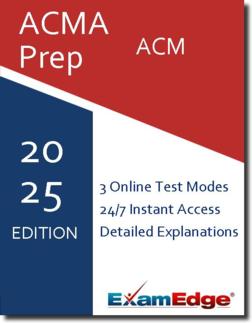ACMA ACM (ACM) Practice Tests & Test Prep by Exam Edge - Additional Information
Based on 17 Reviews
- Real Exam Simulation: Timed questions and matching content build comfort for your ACMA ACM test day.
- Instant, 24/7 Access: Web-based ACMA Accredited Case Manager practice exams with no software needed.
- Clear Explanations: Step-by-step answers and explanations for your ACMA exam to strengthen understanding.
- Boosted Confidence: Reduces anxiety and improves test-taking skills to ace your ACMA Accredited Case Manager (ACM).

ACMA Accredited Case Manager - Additional Information
What is the ACMA Accredited Case Manager (ACM) Certification?
Created by the American Case Management Association (ACMA), the ACM exam tests the knowledge of nurses and social workers who wish to become Accredited Case Managers. In order to qualify for the exam, you'll need to be a nurse or social worker with at least 36 months of experience in a health delivery system as well as a full year of experience with Health System Case Management.
The exam is well-regarded in the healthcare sphere as it requires full licensure as a registered nurse (RN) or social worker. It also allows those who pass the exam to work in a variety of settings, including hospitals, acute care centers, and transition of care environments. If you desire to become a case manager, getting your ACM accreditation can help open many career doors for you. ACM practice tests are among the retinue of study guides and practice exams that we offer at Exam Edge to help future case managers like you do well on test day.
What is the ACMA ACM Exam like? What to Expect?
As you might expect from a healthcare certification exam, the ACM requires many of its test-takers to display full competency over a range of items. You can expect the test to cover topics you'll need to have mastered in order to become a full-time care manager including screening and assessment protocols, care and case planning, care coordination, intervention methods, and evaluations.
Depending on when you schedule your exam, you can expect to pay as much as $395 to take the test. You will need to complete a multiple-choice section as well as a Specialty Simulation portion. Both parts must be passed in order to achieve certification. If you only pass one, however, that passing grade will be kept on hand for up to six months, and you can retake the ACM exam in that time frame to apply that passing score to your new score.
Why is Taking the ACMA ACM Certification Important?
If you want to be a case manager and help people in need, taking the ACMA ACM certification exam is more than essential. It's necessary! Having the proper accreditation means you will be able to showcase your superior skills in this area, instill trust in your patients, and handle the rigors of case management with confidence and aplomb.
The ACM exam boosts your credibility and chances of getting a job in many fields, including private healthcare systems, long-term care facilities, social safety net institutions, and hospitals. However, despite the importance of this certification, you shouldn't fret or worry about passing the test. At Exam Edge, we offer packs of ACM practice tests that are proven to increase your exam score.
How to Prepare for the ACMA ACM Certification Exam?
Before we get into how ACM practice tests can help you boost your score, we should also discuss the various ways you can prepare for the ACMA ACM certification exam. For starters, get your hands on an ACM study guide. These tools are useful in helping you determine what topics you need to study, in what frequency.
For example, you might use the Pomodoro technique and break your study sessions up into 25-minute intervals. Or, you might use spaced learning practice to spread out your study sessions instead of simply cramming the data into your brain right before you take the exam.
Flashcards are also a standard study tool used in many healthcare circles. One suggestion is that you form a group with other nurses and social workers who are preparing to take the ACM certification test, combine notes, quiz each other with ACM certification practice questions, and develop flashcards to use with each other to ensure that you've memorized vital information.
However, at Exam Edge, we find that practice tests can truly help you pass your certification exam. Our ACM certification practice tests are designed to mimic the real deal in timing and pacing, question distribution, material covered, and scoring method. In other words, taking our practice tests gives you an accurate glimpse of how you would do on the actual test. Use our ACM certification practice tests to familiarize yourself with the format, provide a level of comfort on test day, and dictate which areas you focus on for your studies.
Ready to get started on your prep work? Purchase a bundle of ACM practice tests today!


